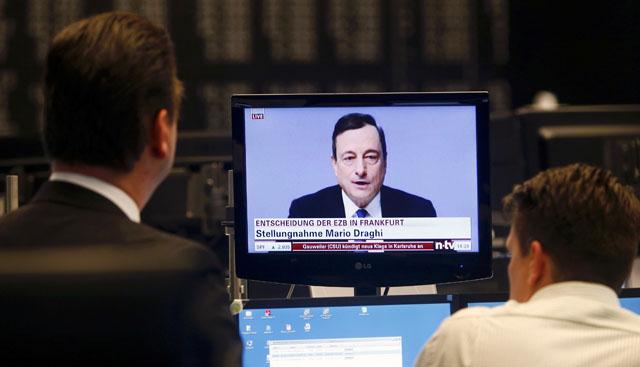You are here
ECB quietly pins hopes on falling euro
By Reuters - Oct 08,2014 - Last updated at Oct 08,2014
FRANKFURT — Grappling with an ailing eurozone economy and stagnant prices, the European Central Bank (ECB) is hoping that help will come from something it cannot control: The value of the euro.
As Washington prepares to stop the supply of cheap money that has been helping it revive the United States, the euro has started to fall steeply against the dollar.
And that's just how the ECB likes it.
With prices in Europe rising at their slowest in five years and its economy stubbornly dormant, Frankfurt is starting to use similar tactics to those used by the Federal Reserve (Fed) — pumping cheap money into the system in the hope of awakening it.
But those efforts have at best an uncertain outcome. Now, however, the divergence of approach on either side of the Atlantic has presented the eurozone with an alternative that works — a weaker currency.
"The one sure-fire way to get things moving is to get the exchange rate down," said RBS economist Richard Barwell. "It's the best antidote to disinflation known to man."
A falling euro would drive up prices by making goods from abroad, whether cars or clothes, more expensive. It would also boost exports, cutting slack as companies work harder to meet demand.
That in turn could bring a rise in inflation towards the ECB's target of just under 2 per cent — one of the building blocks for economic prosperity.
Last month, eurozone inflation slowed to just 0.3 per cent.
ECB President Mario Draghi has been at pains to stress that the central bank does not have an exchange rate target — eager to avoid antagonising the United States and other big economies with “beggar-thy-neighbour” tactics.
But last week Draghi dropped a hint that Europe's different position could be beneficial, noting "significant and increasing differences in the monetary policy cycle between major advanced economies".
For financial markets, this amounted to tacit encouragement to push down the euro, already trading close to 2-year lows.
'Alternative path'
Britain provides useful clues as to what might happen next.
A sharp drop in sterling's exchange rate against the dollar just before the financial crisis set in — from above $2 in mid-2008 to around $1.35 in early 2009 — fed through quickly. Consumer prices bounced from 1.1 per cent in September 2009 to 5.2 per cent two years' later — in large part due to the currency effect.
That evidence makes many officials in Kaiserstrasse, the Frankfurt address of the ECB, quietly optimistic, given the currency has dropped from nearly $1.4 in May to around $1.26 now.
Last month, the ECB published a report exploring "an alternative path for the euro" — a fall in its value to $1.24 by 2016 that is well on the way to becoming reality.
That would increase the eurozone's 8.5 trillion euros economy by up to 0.3 per cent next year and in 2016, and in turn lift the bloc's price inflation, the ECB's primary benchmark of health, by up to 0.3 per cent — doubling the current rate.
Some predict an even steeper drop, and implicitly, a greater boost to the economy. Deutsche Bank forecasts that one euro could be worth less than a dollar by late 2017.
Short relief
However some economists believe any impact in Europe would be short-lived and that, just as in the case of Britain, further measures would be needed before a genuine recovery is possible.
"The depreciation of the euro is necessary. But it is not sufficient," says Paul De Grauwe, an economist with the London School of Economics. "We need to do other things, such as start country investment".
And while the weakening euro will help exporters selling around the globe, it will do little for trade between the 18 countries in the bloc.
"You need internal demand to grow and you have a serious limitation there," said Santiago Carbo-Valverde, a Spanish economist at Britain's Bangor University. "You can sell to China but you need the eurozone."
Proof: After Britain's currency tumbled, it discovered more was required to kick-start an economy.
London used a funding-for-lending scheme to spur mortgage loans and property prices — but directing one island economy is easier than forging change across the uneasy alliance of 18 countries in the eurozone, a mix of cultures and languages where views on saving and spending contrast sharply from Berlin to Athens.
On its own, the ECB has little hope of arresting decline.
Draghi has urged governments to reform their economies by paring back taxes or making labour rules more flexible, but his appeals have fallen largely on deaf ears: France recently issued a defiant budget plan that will flout European Union spending limits.
Ultimately, then, even a falling euro may not be enough to lift pressure on the ECB to embrace full-blown quantitative easing by buying government bonds.
"The falling euro would help but if you step back, currency value change is a zero sum game," said Hung Tran, executive managing director of the Institute of International Finance, a group representing banks and financial groups.
"One currency's gain is another currency's loss. It doesn't change the picture of the global economy and one of low growth for Europe," he added.
Related Articles
The European Central Bank (ECB) took the ultimate policy leap on Thursday, launching a government bond-buying programme which will pump hundreds of billions in new money into a sagging eurozone economy.
The European Central Bank (ECB) will launch into quantitative easing (QE) next week having increased its economic growth forecasts for this year and next.
FRANKFURT — The European Central Bank (ECB) on Thursday dismissed German criticism of its monetary policy, insisting its benefits would take














